Community Action Against Liquor Firm in South Australia: A Report
VerifiedAdded on 2022/11/10
|11
|1926
|196
Report
AI Summary
This report analyzes the actions taken by a local community in South Australia to prevent the establishment of a liquor firm. It begins with an introduction that highlights the importance of community awareness of liquor legislation and the roles of law enforcement agencies and NGOs. The report then outlines the statutory framework the firm must adhere to, including relevant acts concerning children, education, the environment, and road transport, as well as the Companies Act. It describes the proposal as an unsolicited business venture and outlines the assessment process, including compliance criteria. The report details the roles and responsibilities of the community group, including gathering information, conducting SWOT analyses, and potential actions such as boycotts and reporting non-compliance. It then explores legal avenues for challenging the proposal, including merits appeals and judicial reviews, comparing their advantages and disadvantages. The report also discusses less expensive legal alternatives, such as reasonableness and proportionality principles. The conclusion emphasizes the need for regulatory requirements that balance investor profits with community well-being and encourages stakeholders to promote societal development.

Environmental science
Submitted by:
Student number:
Submission date:
Supervisor:
Submitted by:
Student number:
Submission date:
Supervisor:
Paraphrase This Document
Need a fresh take? Get an instant paraphrase of this document with our AI Paraphraser
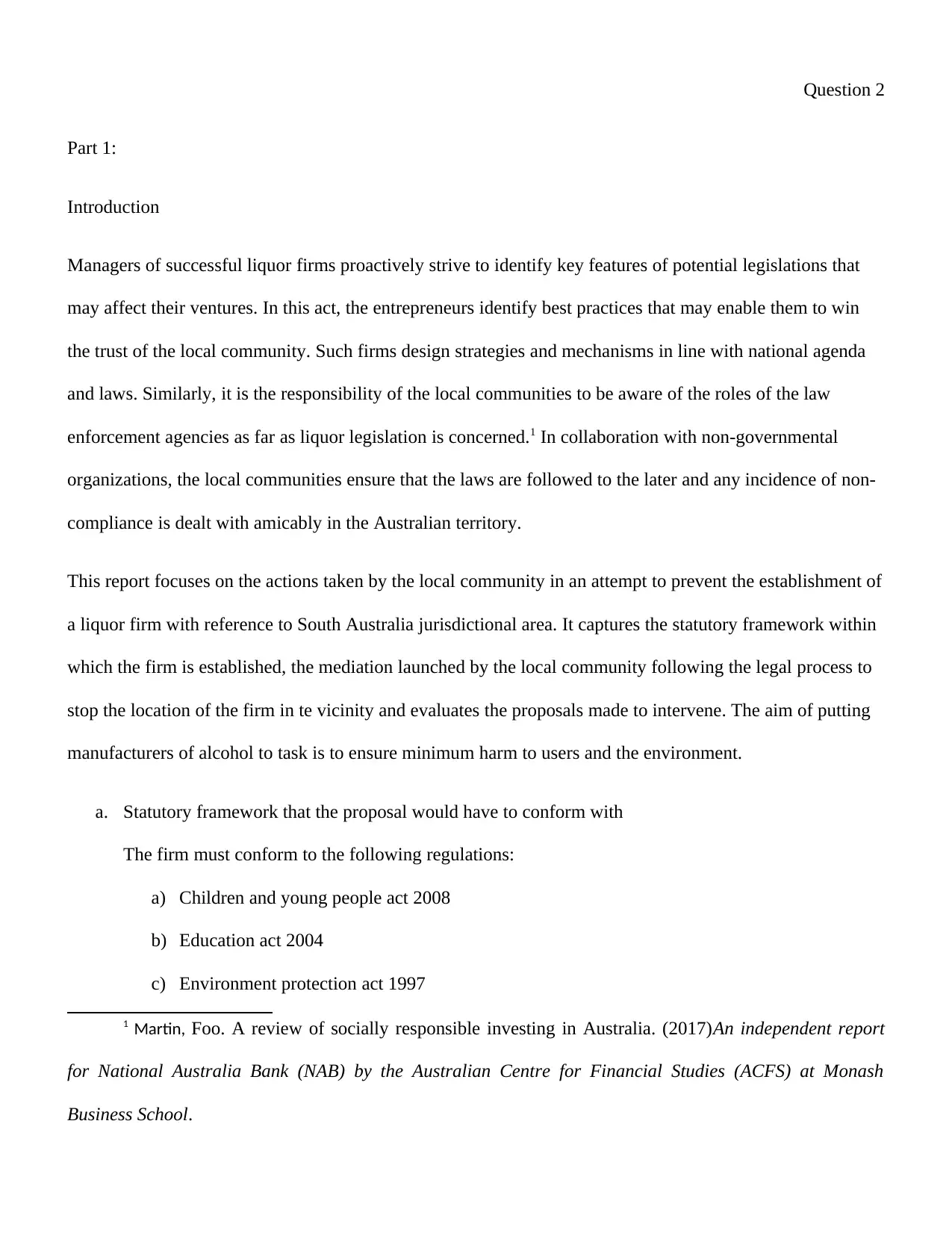
Question 2
Part 1:
Introduction
Managers of successful liquor firms proactively strive to identify key features of potential legislations that
may affect their ventures. In this act, the entrepreneurs identify best practices that may enable them to win
the trust of the local community. Such firms design strategies and mechanisms in line with national agenda
and laws. Similarly, it is the responsibility of the local communities to be aware of the roles of the law
enforcement agencies as far as liquor legislation is concerned.1 In collaboration with non-governmental
organizations, the local communities ensure that the laws are followed to the later and any incidence of non-
compliance is dealt with amicably in the Australian territory.
This report focuses on the actions taken by the local community in an attempt to prevent the establishment of
a liquor firm with reference to South Australia jurisdictional area. It captures the statutory framework within
which the firm is established, the mediation launched by the local community following the legal process to
stop the location of the firm in te vicinity and evaluates the proposals made to intervene. The aim of putting
manufacturers of alcohol to task is to ensure minimum harm to users and the environment.
a. Statutory framework that the proposal would have to conform with
The firm must conform to the following regulations:
a) Children and young people act 2008
b) Education act 2004
c) Environment protection act 1997
1 Martin, Foo. A review of socially responsible investing in Australia. (2017)An independent report
for National Australia Bank (NAB) by the Australian Centre for Financial Studies (ACFS) at Monash
Business School.
Part 1:
Introduction
Managers of successful liquor firms proactively strive to identify key features of potential legislations that
may affect their ventures. In this act, the entrepreneurs identify best practices that may enable them to win
the trust of the local community. Such firms design strategies and mechanisms in line with national agenda
and laws. Similarly, it is the responsibility of the local communities to be aware of the roles of the law
enforcement agencies as far as liquor legislation is concerned.1 In collaboration with non-governmental
organizations, the local communities ensure that the laws are followed to the later and any incidence of non-
compliance is dealt with amicably in the Australian territory.
This report focuses on the actions taken by the local community in an attempt to prevent the establishment of
a liquor firm with reference to South Australia jurisdictional area. It captures the statutory framework within
which the firm is established, the mediation launched by the local community following the legal process to
stop the location of the firm in te vicinity and evaluates the proposals made to intervene. The aim of putting
manufacturers of alcohol to task is to ensure minimum harm to users and the environment.
a. Statutory framework that the proposal would have to conform with
The firm must conform to the following regulations:
a) Children and young people act 2008
b) Education act 2004
c) Environment protection act 1997
1 Martin, Foo. A review of socially responsible investing in Australia. (2017)An independent report
for National Australia Bank (NAB) by the Australian Centre for Financial Studies (ACFS) at Monash
Business School.
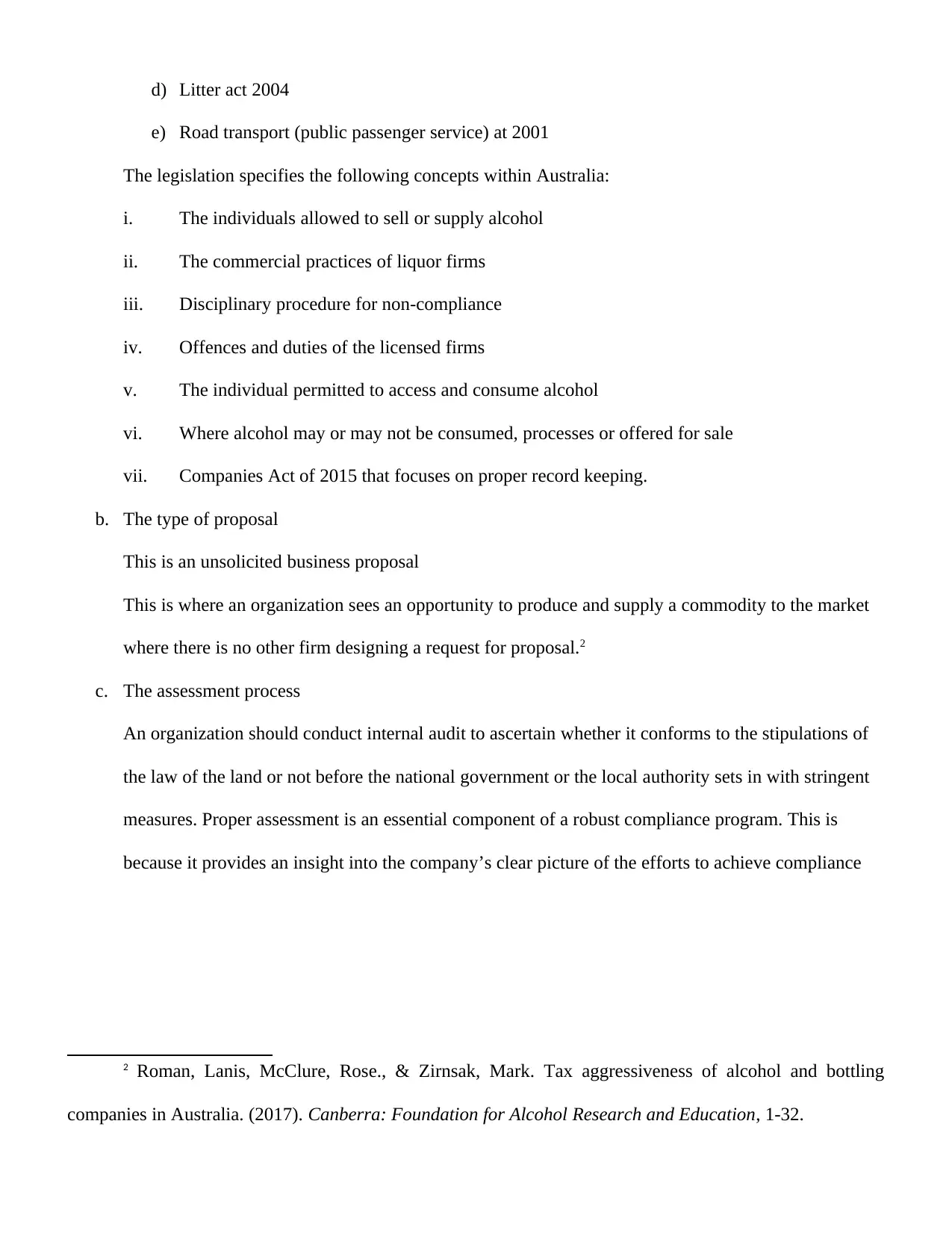
d) Litter act 2004
e) Road transport (public passenger service) at 2001
The legislation specifies the following concepts within Australia:
i. The individuals allowed to sell or supply alcohol
ii. The commercial practices of liquor firms
iii. Disciplinary procedure for non-compliance
iv. Offences and duties of the licensed firms
v. The individual permitted to access and consume alcohol
vi. Where alcohol may or may not be consumed, processes or offered for sale
vii. Companies Act of 2015 that focuses on proper record keeping.
b. The type of proposal
This is an unsolicited business proposal
This is where an organization sees an opportunity to produce and supply a commodity to the market
where there is no other firm designing a request for proposal.2
c. The assessment process
An organization should conduct internal audit to ascertain whether it conforms to the stipulations of
the law of the land or not before the national government or the local authority sets in with stringent
measures. Proper assessment is an essential component of a robust compliance program. This is
because it provides an insight into the company’s clear picture of the efforts to achieve compliance
2 Roman, Lanis, McClure, Rose., & Zirnsak, Mark. Tax aggressiveness of alcohol and bottling
companies in Australia. (2017). Canberra: Foundation for Alcohol Research and Education, 1-32.
e) Road transport (public passenger service) at 2001
The legislation specifies the following concepts within Australia:
i. The individuals allowed to sell or supply alcohol
ii. The commercial practices of liquor firms
iii. Disciplinary procedure for non-compliance
iv. Offences and duties of the licensed firms
v. The individual permitted to access and consume alcohol
vi. Where alcohol may or may not be consumed, processes or offered for sale
vii. Companies Act of 2015 that focuses on proper record keeping.
b. The type of proposal
This is an unsolicited business proposal
This is where an organization sees an opportunity to produce and supply a commodity to the market
where there is no other firm designing a request for proposal.2
c. The assessment process
An organization should conduct internal audit to ascertain whether it conforms to the stipulations of
the law of the land or not before the national government or the local authority sets in with stringent
measures. Proper assessment is an essential component of a robust compliance program. This is
because it provides an insight into the company’s clear picture of the efforts to achieve compliance
2 Roman, Lanis, McClure, Rose., & Zirnsak, Mark. Tax aggressiveness of alcohol and bottling
companies in Australia. (2017). Canberra: Foundation for Alcohol Research and Education, 1-32.
⊘ This is a preview!⊘
Do you want full access?
Subscribe today to unlock all pages.

Trusted by 1+ million students worldwide
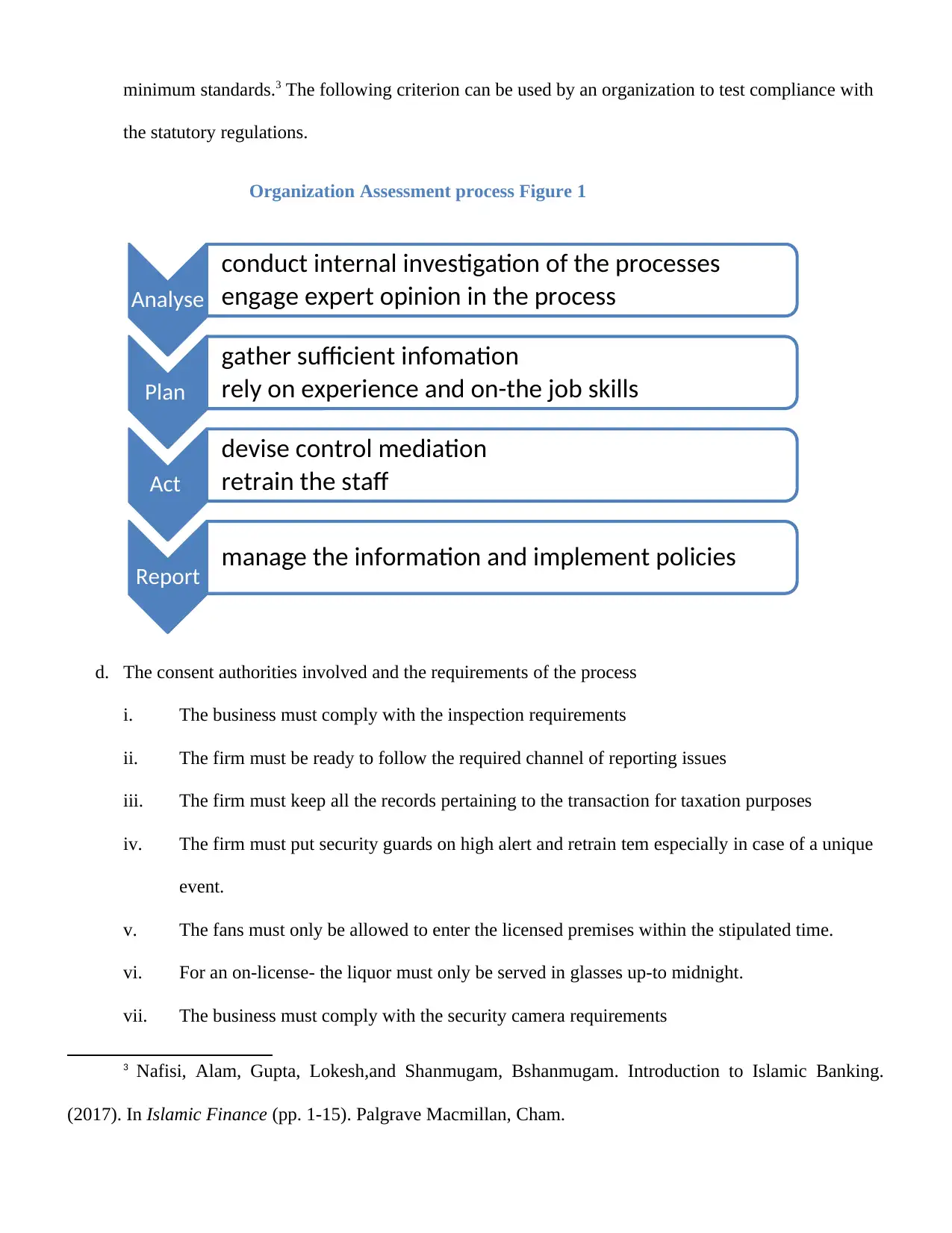
minimum standards.3 The following criterion can be used by an organization to test compliance with
the statutory regulations.
Organization Assessment process Figure 1
d. The consent authorities involved and the requirements of the process
i. The business must comply with the inspection requirements
ii. The firm must be ready to follow the required channel of reporting issues
iii. The firm must keep all the records pertaining to the transaction for taxation purposes
iv. The firm must put security guards on high alert and retrain tem especially in case of a unique
event.
v. The fans must only be allowed to enter the licensed premises within the stipulated time.
vi. For an on-license- the liquor must only be served in glasses up-to midnight.
vii. The business must comply with the security camera requirements
3 Nafisi, Alam, Gupta, Lokesh,and Shanmugam, Bshanmugam. Introduction to Islamic Banking.
(2017). In Islamic Finance (pp. 1-15). Palgrave Macmillan, Cham.
Analyse
conduct internal investigation of the processes
engage expert opinion in the process
Plan
gather sufficient infomation
rely on experience and on-the job skills
Act
devise control mediation
retrain the staff
Report manage the information and implement policies
the statutory regulations.
Organization Assessment process Figure 1
d. The consent authorities involved and the requirements of the process
i. The business must comply with the inspection requirements
ii. The firm must be ready to follow the required channel of reporting issues
iii. The firm must keep all the records pertaining to the transaction for taxation purposes
iv. The firm must put security guards on high alert and retrain tem especially in case of a unique
event.
v. The fans must only be allowed to enter the licensed premises within the stipulated time.
vi. For an on-license- the liquor must only be served in glasses up-to midnight.
vii. The business must comply with the security camera requirements
3 Nafisi, Alam, Gupta, Lokesh,and Shanmugam, Bshanmugam. Introduction to Islamic Banking.
(2017). In Islamic Finance (pp. 1-15). Palgrave Macmillan, Cham.
Analyse
conduct internal investigation of the processes
engage expert opinion in the process
Plan
gather sufficient infomation
rely on experience and on-the job skills
Act
devise control mediation
retrain the staff
Report manage the information and implement policies
Paraphrase This Document
Need a fresh take? Get an instant paraphrase of this document with our AI Paraphraser
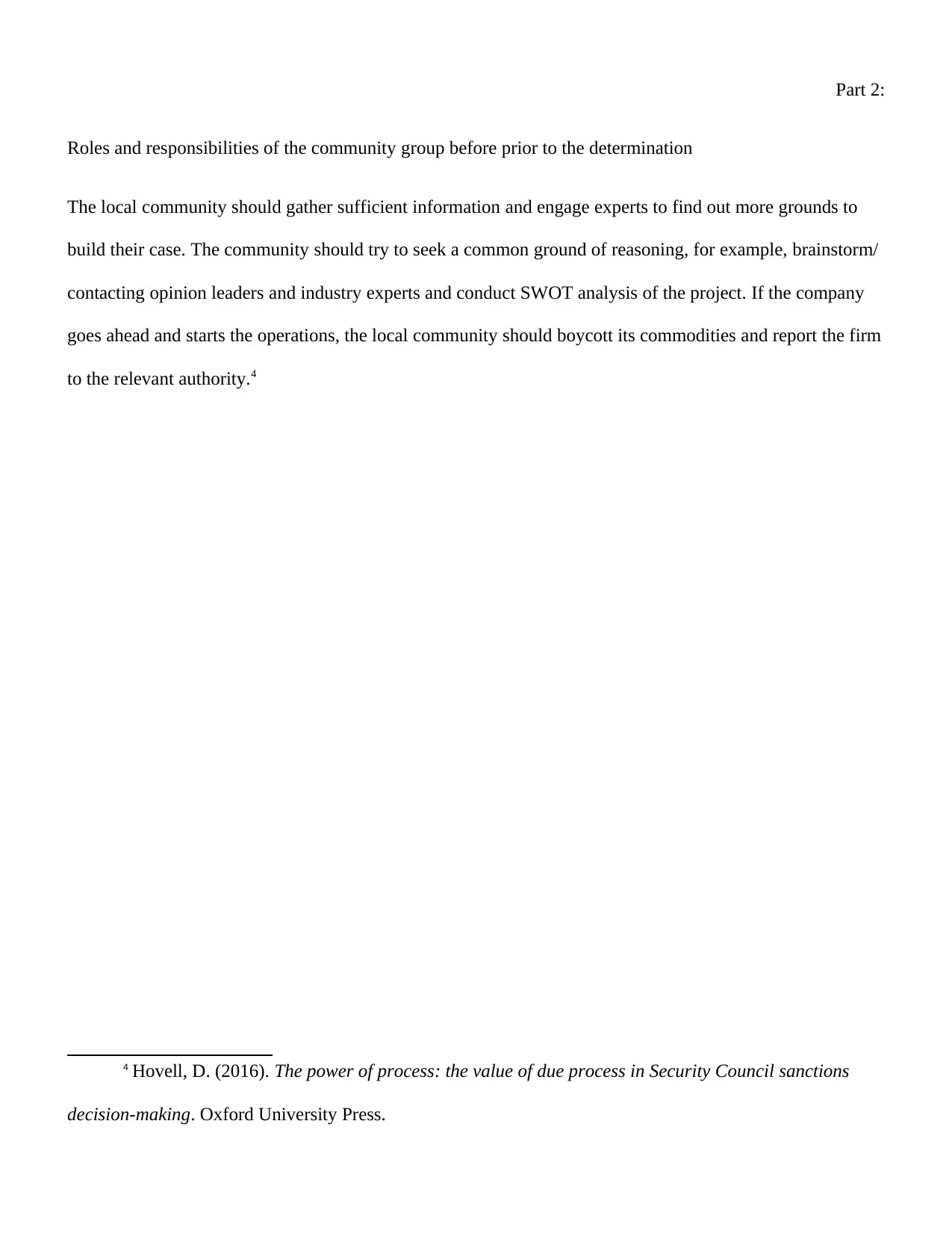
Part 2:
Roles and responsibilities of the community group before prior to the determination
The local community should gather sufficient information and engage experts to find out more grounds to
build their case. The community should try to seek a common ground of reasoning, for example, brainstorm/
contacting opinion leaders and industry experts and conduct SWOT analysis of the project. If the company
goes ahead and starts the operations, the local community should boycott its commodities and report the firm
to the relevant authority.4
4 Hovell, D. (2016). The power of process: the value of due process in Security Council sanctions
decision-making. Oxford University Press.
Roles and responsibilities of the community group before prior to the determination
The local community should gather sufficient information and engage experts to find out more grounds to
build their case. The community should try to seek a common ground of reasoning, for example, brainstorm/
contacting opinion leaders and industry experts and conduct SWOT analysis of the project. If the company
goes ahead and starts the operations, the local community should boycott its commodities and report the firm
to the relevant authority.4
4 Hovell, D. (2016). The power of process: the value of due process in Security Council sanctions
decision-making. Oxford University Press.
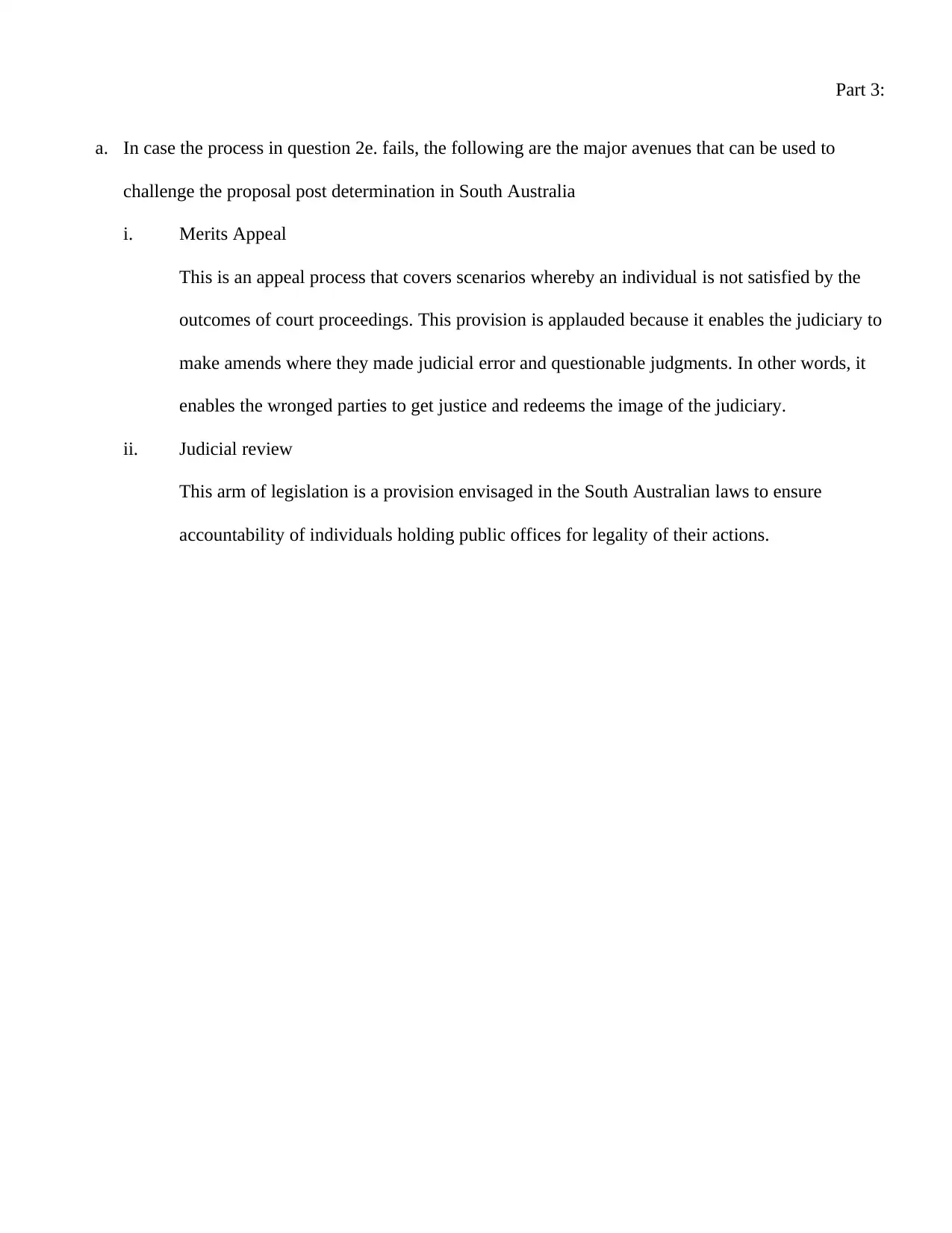
Part 3:
a. In case the process in question 2e. fails, the following are the major avenues that can be used to
challenge the proposal post determination in South Australia
i. Merits Appeal
This is an appeal process that covers scenarios whereby an individual is not satisfied by the
outcomes of court proceedings. This provision is applauded because it enables the judiciary to
make amends where they made judicial error and questionable judgments. In other words, it
enables the wronged parties to get justice and redeems the image of the judiciary.
ii. Judicial review
This arm of legislation is a provision envisaged in the South Australian laws to ensure
accountability of individuals holding public offices for legality of their actions.
a. In case the process in question 2e. fails, the following are the major avenues that can be used to
challenge the proposal post determination in South Australia
i. Merits Appeal
This is an appeal process that covers scenarios whereby an individual is not satisfied by the
outcomes of court proceedings. This provision is applauded because it enables the judiciary to
make amends where they made judicial error and questionable judgments. In other words, it
enables the wronged parties to get justice and redeems the image of the judiciary.
ii. Judicial review
This arm of legislation is a provision envisaged in the South Australian laws to ensure
accountability of individuals holding public offices for legality of their actions.
⊘ This is a preview!⊘
Do you want full access?
Subscribe today to unlock all pages.

Trusted by 1+ million students worldwide
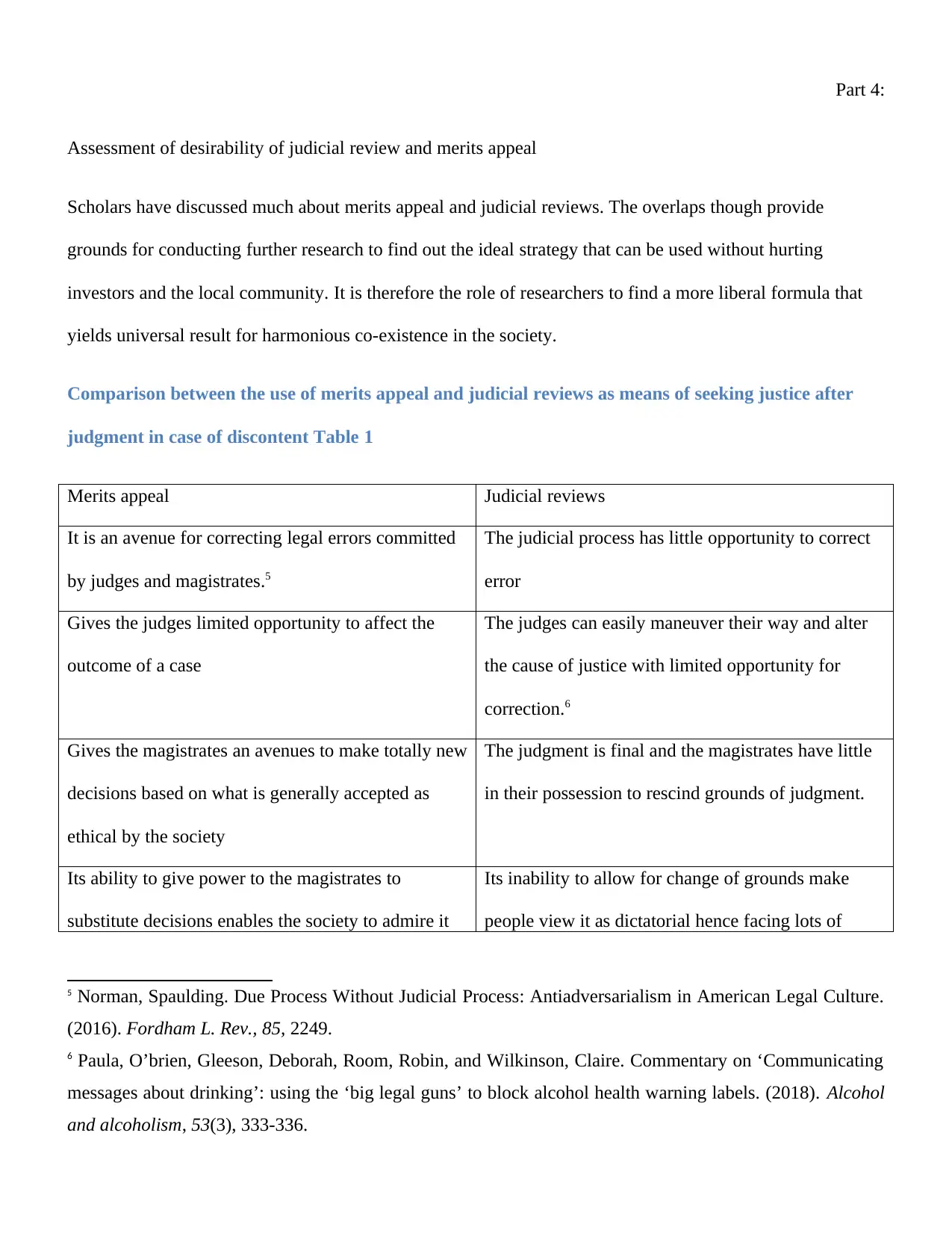
Part 4:
Assessment of desirability of judicial review and merits appeal
Scholars have discussed much about merits appeal and judicial reviews. The overlaps though provide
grounds for conducting further research to find out the ideal strategy that can be used without hurting
investors and the local community. It is therefore the role of researchers to find a more liberal formula that
yields universal result for harmonious co-existence in the society.
Comparison between the use of merits appeal and judicial reviews as means of seeking justice after
judgment in case of discontent Table 1
Merits appeal Judicial reviews
It is an avenue for correcting legal errors committed
by judges and magistrates.5
The judicial process has little opportunity to correct
error
Gives the judges limited opportunity to affect the
outcome of a case
The judges can easily maneuver their way and alter
the cause of justice with limited opportunity for
correction.6
Gives the magistrates an avenues to make totally new
decisions based on what is generally accepted as
ethical by the society
The judgment is final and the magistrates have little
in their possession to rescind grounds of judgment.
Its ability to give power to the magistrates to
substitute decisions enables the society to admire it
Its inability to allow for change of grounds make
people view it as dictatorial hence facing lots of
5 Norman, Spaulding. Due Process Without Judicial Process: Antiadversarialism in American Legal Culture.
(2016). Fordham L. Rev., 85, 2249.
6 Paula, O’brien, Gleeson, Deborah, Room, Robin, and Wilkinson, Claire. Commentary on ‘Communicating
messages about drinking’: using the ‘big legal guns’ to block alcohol health warning labels. (2018). Alcohol
and alcoholism, 53(3), 333-336.
Assessment of desirability of judicial review and merits appeal
Scholars have discussed much about merits appeal and judicial reviews. The overlaps though provide
grounds for conducting further research to find out the ideal strategy that can be used without hurting
investors and the local community. It is therefore the role of researchers to find a more liberal formula that
yields universal result for harmonious co-existence in the society.
Comparison between the use of merits appeal and judicial reviews as means of seeking justice after
judgment in case of discontent Table 1
Merits appeal Judicial reviews
It is an avenue for correcting legal errors committed
by judges and magistrates.5
The judicial process has little opportunity to correct
error
Gives the judges limited opportunity to affect the
outcome of a case
The judges can easily maneuver their way and alter
the cause of justice with limited opportunity for
correction.6
Gives the magistrates an avenues to make totally new
decisions based on what is generally accepted as
ethical by the society
The judgment is final and the magistrates have little
in their possession to rescind grounds of judgment.
Its ability to give power to the magistrates to
substitute decisions enables the society to admire it
Its inability to allow for change of grounds make
people view it as dictatorial hence facing lots of
5 Norman, Spaulding. Due Process Without Judicial Process: Antiadversarialism in American Legal Culture.
(2016). Fordham L. Rev., 85, 2249.
6 Paula, O’brien, Gleeson, Deborah, Room, Robin, and Wilkinson, Claire. Commentary on ‘Communicating
messages about drinking’: using the ‘big legal guns’ to block alcohol health warning labels. (2018). Alcohol
and alcoholism, 53(3), 333-336.
Paraphrase This Document
Need a fresh take? Get an instant paraphrase of this document with our AI Paraphraser
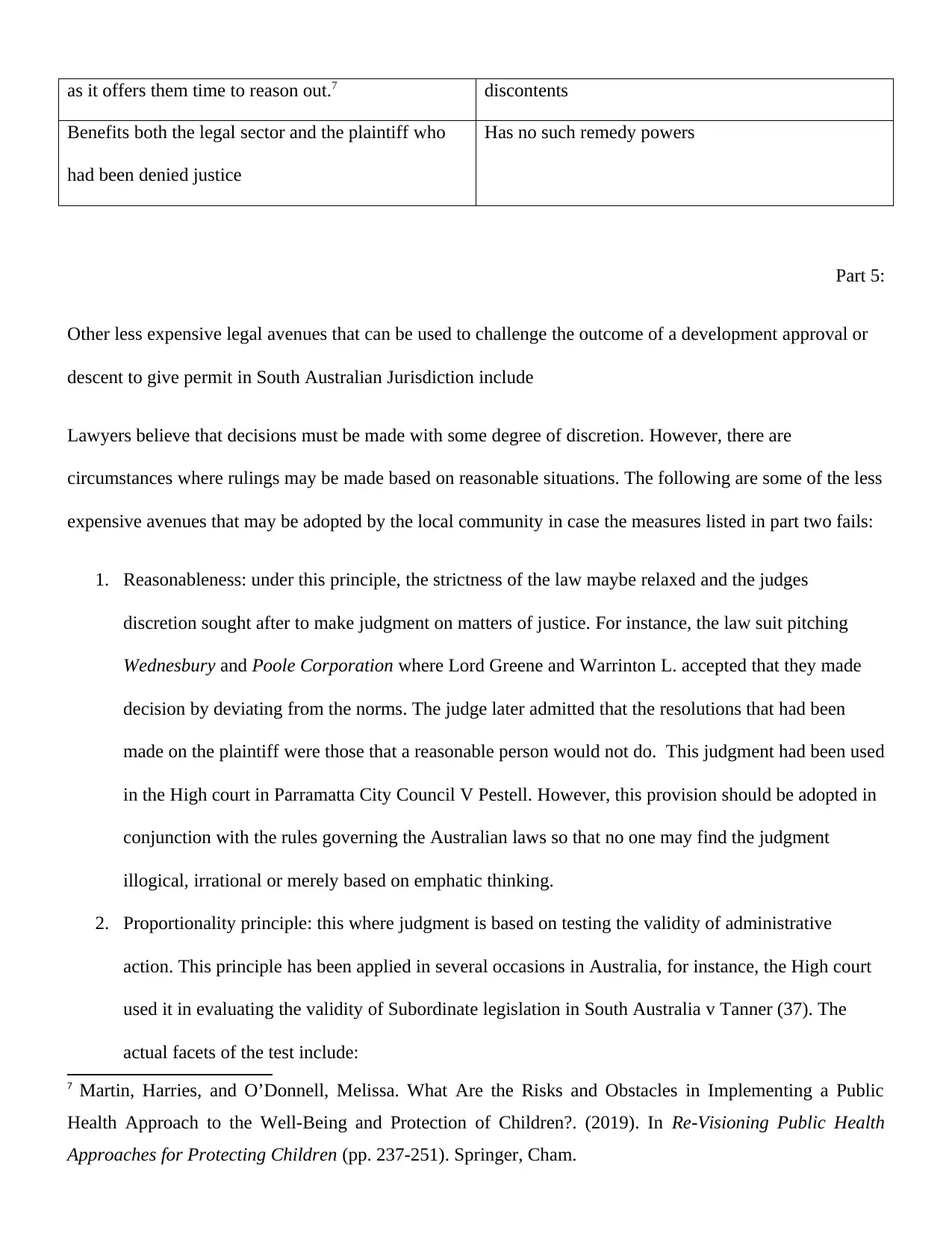
as it offers them time to reason out.7 discontents
Benefits both the legal sector and the plaintiff who
had been denied justice
Has no such remedy powers
Part 5:
Other less expensive legal avenues that can be used to challenge the outcome of a development approval or
descent to give permit in South Australian Jurisdiction include
Lawyers believe that decisions must be made with some degree of discretion. However, there are
circumstances where rulings may be made based on reasonable situations. The following are some of the less
expensive avenues that may be adopted by the local community in case the measures listed in part two fails:
1. Reasonableness: under this principle, the strictness of the law maybe relaxed and the judges
discretion sought after to make judgment on matters of justice. For instance, the law suit pitching
Wednesbury and Poole Corporation where Lord Greene and Warrinton L. accepted that they made
decision by deviating from the norms. The judge later admitted that the resolutions that had been
made on the plaintiff were those that a reasonable person would not do. This judgment had been used
in the High court in Parramatta City Council V Pestell. However, this provision should be adopted in
conjunction with the rules governing the Australian laws so that no one may find the judgment
illogical, irrational or merely based on emphatic thinking.
2. Proportionality principle: this where judgment is based on testing the validity of administrative
action. This principle has been applied in several occasions in Australia, for instance, the High court
used it in evaluating the validity of Subordinate legislation in South Australia v Tanner (37). The
actual facets of the test include:
7 Martin, Harries, and O’Donnell, Melissa. What Are the Risks and Obstacles in Implementing a Public
Health Approach to the Well-Being and Protection of Children?. (2019). In Re-Visioning Public Health
Approaches for Protecting Children (pp. 237-251). Springer, Cham.
Benefits both the legal sector and the plaintiff who
had been denied justice
Has no such remedy powers
Part 5:
Other less expensive legal avenues that can be used to challenge the outcome of a development approval or
descent to give permit in South Australian Jurisdiction include
Lawyers believe that decisions must be made with some degree of discretion. However, there are
circumstances where rulings may be made based on reasonable situations. The following are some of the less
expensive avenues that may be adopted by the local community in case the measures listed in part two fails:
1. Reasonableness: under this principle, the strictness of the law maybe relaxed and the judges
discretion sought after to make judgment on matters of justice. For instance, the law suit pitching
Wednesbury and Poole Corporation where Lord Greene and Warrinton L. accepted that they made
decision by deviating from the norms. The judge later admitted that the resolutions that had been
made on the plaintiff were those that a reasonable person would not do. This judgment had been used
in the High court in Parramatta City Council V Pestell. However, this provision should be adopted in
conjunction with the rules governing the Australian laws so that no one may find the judgment
illogical, irrational or merely based on emphatic thinking.
2. Proportionality principle: this where judgment is based on testing the validity of administrative
action. This principle has been applied in several occasions in Australia, for instance, the High court
used it in evaluating the validity of Subordinate legislation in South Australia v Tanner (37). The
actual facets of the test include:
7 Martin, Harries, and O’Donnell, Melissa. What Are the Risks and Obstacles in Implementing a Public
Health Approach to the Well-Being and Protection of Children?. (2019). In Re-Visioning Public Health
Approaches for Protecting Children (pp. 237-251). Springer, Cham.
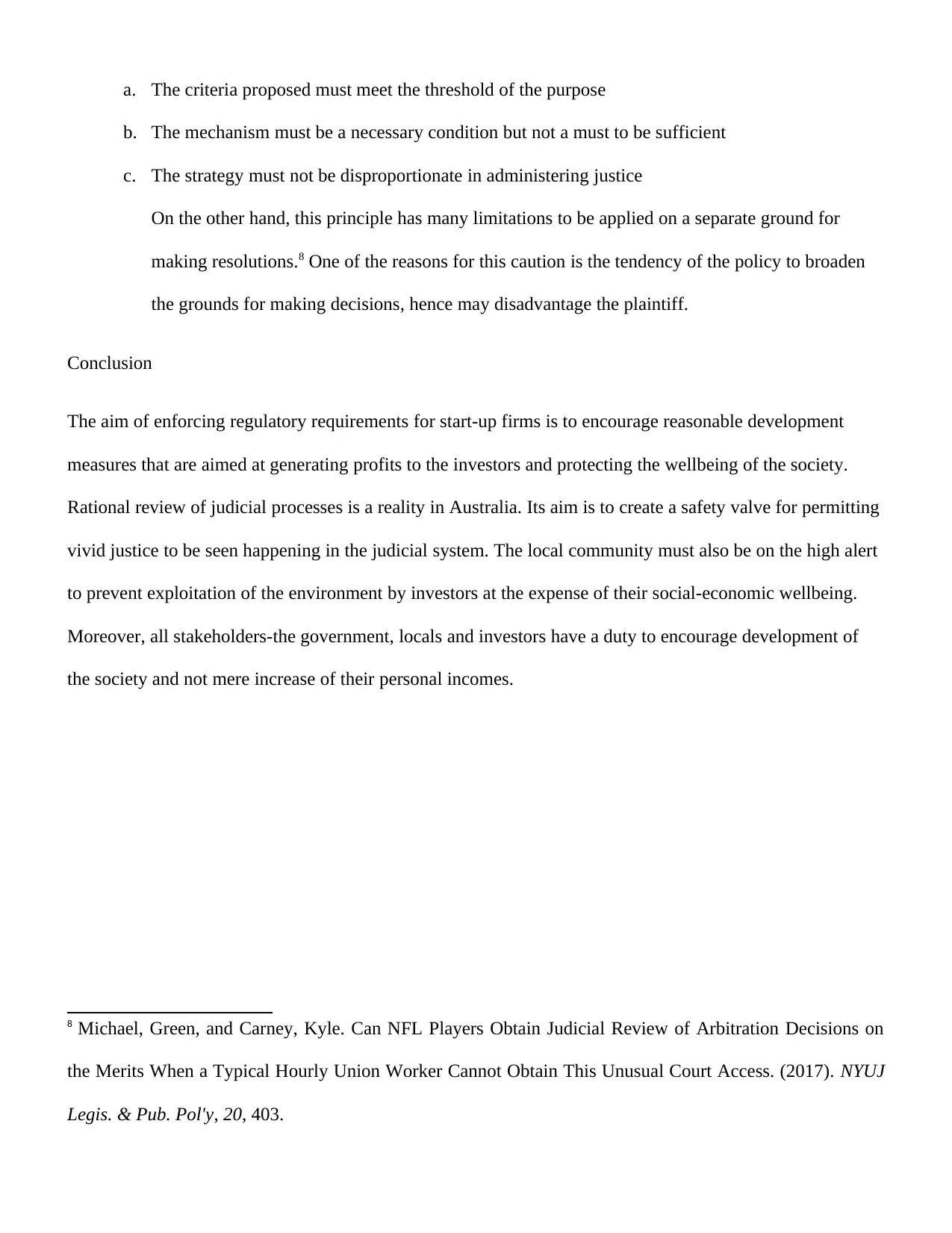
a. The criteria proposed must meet the threshold of the purpose
b. The mechanism must be a necessary condition but not a must to be sufficient
c. The strategy must not be disproportionate in administering justice
On the other hand, this principle has many limitations to be applied on a separate ground for
making resolutions.8 One of the reasons for this caution is the tendency of the policy to broaden
the grounds for making decisions, hence may disadvantage the plaintiff.
Conclusion
The aim of enforcing regulatory requirements for start-up firms is to encourage reasonable development
measures that are aimed at generating profits to the investors and protecting the wellbeing of the society.
Rational review of judicial processes is a reality in Australia. Its aim is to create a safety valve for permitting
vivid justice to be seen happening in the judicial system. The local community must also be on the high alert
to prevent exploitation of the environment by investors at the expense of their social-economic wellbeing.
Moreover, all stakeholders-the government, locals and investors have a duty to encourage development of
the society and not mere increase of their personal incomes.
8 Michael, Green, and Carney, Kyle. Can NFL Players Obtain Judicial Review of Arbitration Decisions on
the Merits When a Typical Hourly Union Worker Cannot Obtain This Unusual Court Access. (2017). NYUJ
Legis. & Pub. Pol'y, 20, 403.
b. The mechanism must be a necessary condition but not a must to be sufficient
c. The strategy must not be disproportionate in administering justice
On the other hand, this principle has many limitations to be applied on a separate ground for
making resolutions.8 One of the reasons for this caution is the tendency of the policy to broaden
the grounds for making decisions, hence may disadvantage the plaintiff.
Conclusion
The aim of enforcing regulatory requirements for start-up firms is to encourage reasonable development
measures that are aimed at generating profits to the investors and protecting the wellbeing of the society.
Rational review of judicial processes is a reality in Australia. Its aim is to create a safety valve for permitting
vivid justice to be seen happening in the judicial system. The local community must also be on the high alert
to prevent exploitation of the environment by investors at the expense of their social-economic wellbeing.
Moreover, all stakeholders-the government, locals and investors have a duty to encourage development of
the society and not mere increase of their personal incomes.
8 Michael, Green, and Carney, Kyle. Can NFL Players Obtain Judicial Review of Arbitration Decisions on
the Merits When a Typical Hourly Union Worker Cannot Obtain This Unusual Court Access. (2017). NYUJ
Legis. & Pub. Pol'y, 20, 403.
⊘ This is a preview!⊘
Do you want full access?
Subscribe today to unlock all pages.

Trusted by 1+ million students worldwide
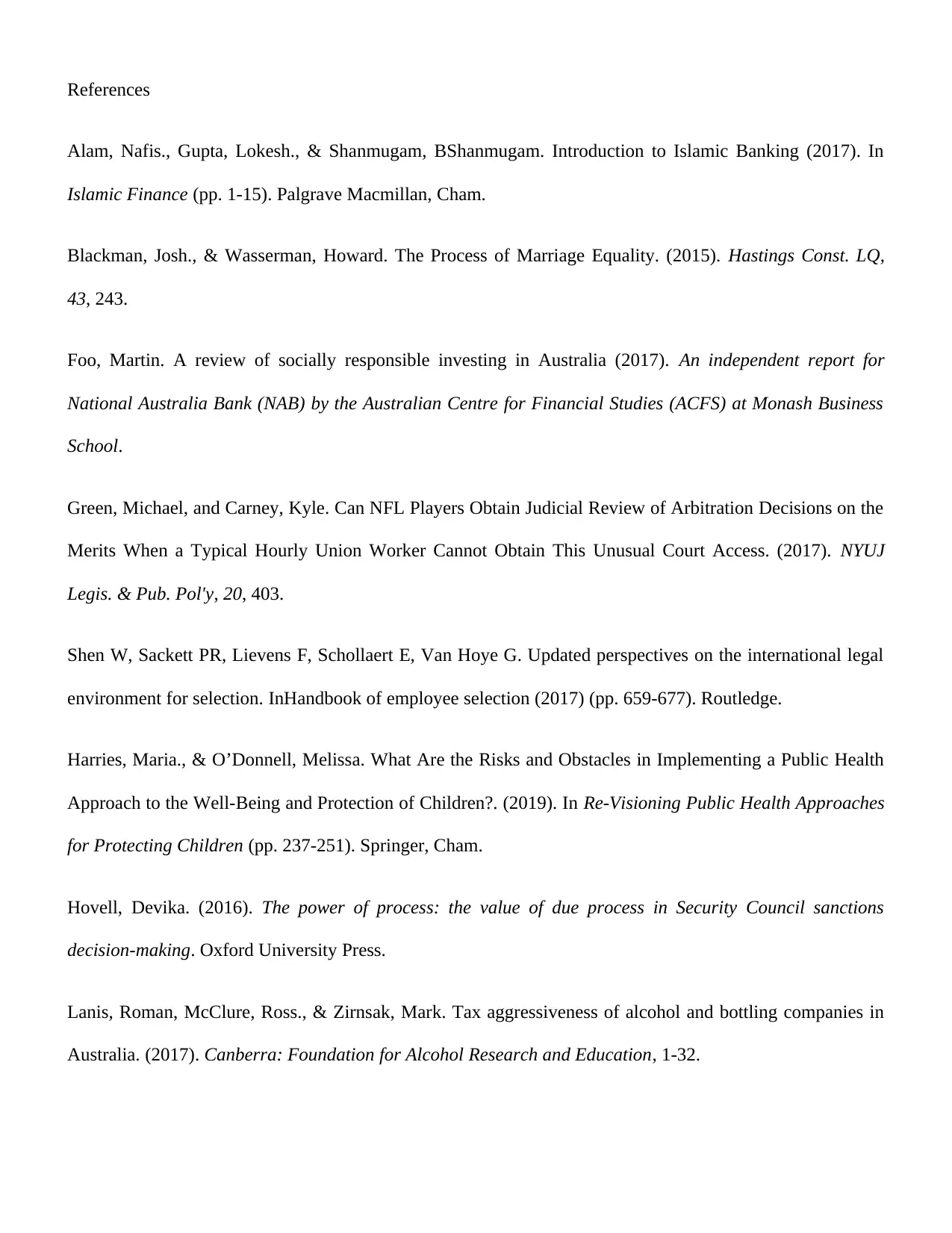
References
Alam, Nafis., Gupta, Lokesh., & Shanmugam, BShanmugam. Introduction to Islamic Banking (2017). In
Islamic Finance (pp. 1-15). Palgrave Macmillan, Cham.
Blackman, Josh., & Wasserman, Howard. The Process of Marriage Equality. (2015). Hastings Const. LQ,
43, 243.
Foo, Martin. A review of socially responsible investing in Australia (2017). An independent report for
National Australia Bank (NAB) by the Australian Centre for Financial Studies (ACFS) at Monash Business
School.
Green, Michael, and Carney, Kyle. Can NFL Players Obtain Judicial Review of Arbitration Decisions on the
Merits When a Typical Hourly Union Worker Cannot Obtain This Unusual Court Access. (2017). NYUJ
Legis. & Pub. Pol'y, 20, 403.
Shen W, Sackett PR, Lievens F, Schollaert E, Van Hoye G. Updated perspectives on the international legal
environment for selection. InHandbook of employee selection (2017) (pp. 659-677). Routledge.
Harries, Maria., & O’Donnell, Melissa. What Are the Risks and Obstacles in Implementing a Public Health
Approach to the Well-Being and Protection of Children?. (2019). In Re-Visioning Public Health Approaches
for Protecting Children (pp. 237-251). Springer, Cham.
Hovell, Devika. (2016). The power of process: the value of due process in Security Council sanctions
decision-making. Oxford University Press.
Lanis, Roman, McClure, Ross., & Zirnsak, Mark. Tax aggressiveness of alcohol and bottling companies in
Australia. (2017). Canberra: Foundation for Alcohol Research and Education, 1-32.
Alam, Nafis., Gupta, Lokesh., & Shanmugam, BShanmugam. Introduction to Islamic Banking (2017). In
Islamic Finance (pp. 1-15). Palgrave Macmillan, Cham.
Blackman, Josh., & Wasserman, Howard. The Process of Marriage Equality. (2015). Hastings Const. LQ,
43, 243.
Foo, Martin. A review of socially responsible investing in Australia (2017). An independent report for
National Australia Bank (NAB) by the Australian Centre for Financial Studies (ACFS) at Monash Business
School.
Green, Michael, and Carney, Kyle. Can NFL Players Obtain Judicial Review of Arbitration Decisions on the
Merits When a Typical Hourly Union Worker Cannot Obtain This Unusual Court Access. (2017). NYUJ
Legis. & Pub. Pol'y, 20, 403.
Shen W, Sackett PR, Lievens F, Schollaert E, Van Hoye G. Updated perspectives on the international legal
environment for selection. InHandbook of employee selection (2017) (pp. 659-677). Routledge.
Harries, Maria., & O’Donnell, Melissa. What Are the Risks and Obstacles in Implementing a Public Health
Approach to the Well-Being and Protection of Children?. (2019). In Re-Visioning Public Health Approaches
for Protecting Children (pp. 237-251). Springer, Cham.
Hovell, Devika. (2016). The power of process: the value of due process in Security Council sanctions
decision-making. Oxford University Press.
Lanis, Roman, McClure, Ross., & Zirnsak, Mark. Tax aggressiveness of alcohol and bottling companies in
Australia. (2017). Canberra: Foundation for Alcohol Research and Education, 1-32.
Paraphrase This Document
Need a fresh take? Get an instant paraphrase of this document with our AI Paraphraser
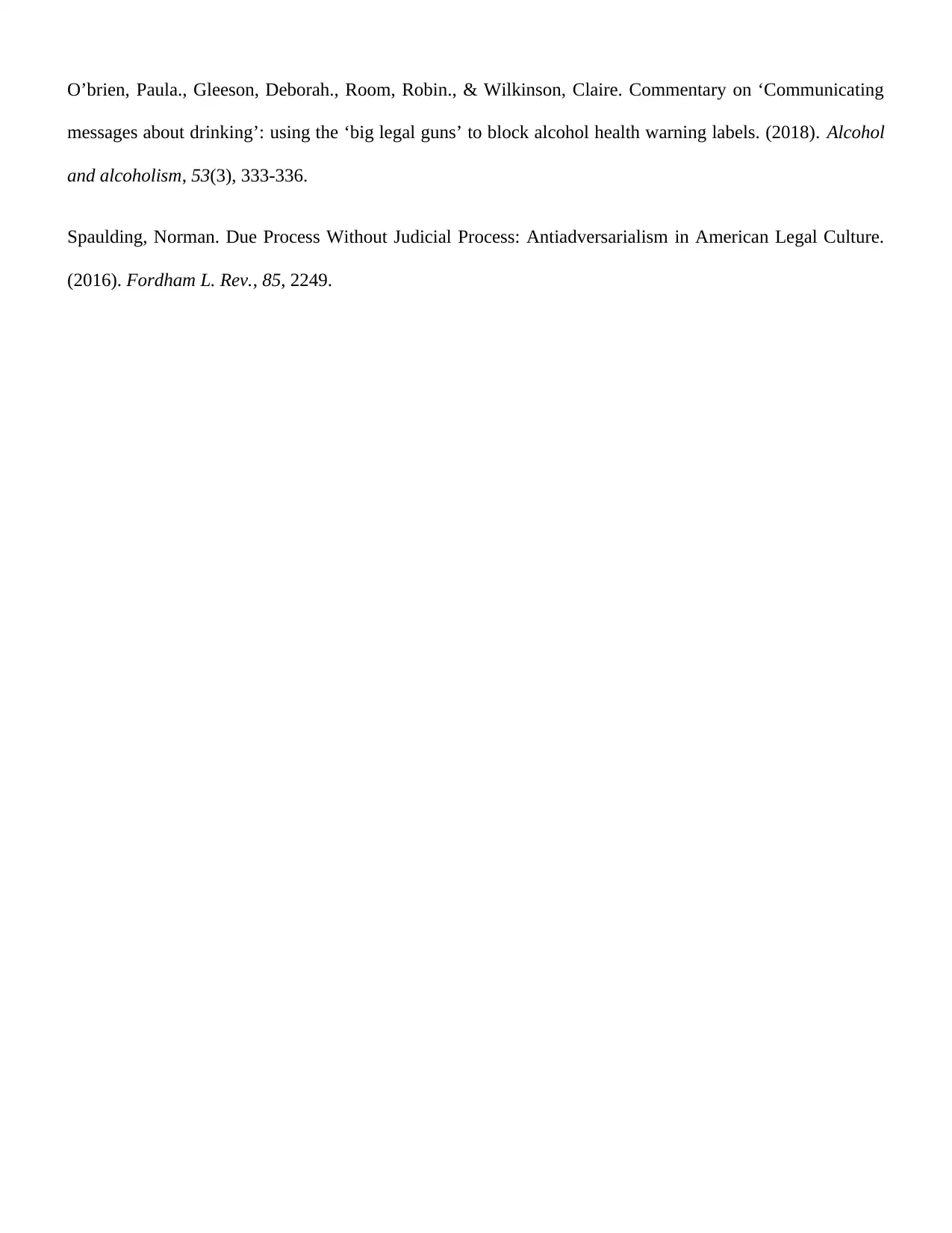
O’brien, Paula., Gleeson, Deborah., Room, Robin., & Wilkinson, Claire. Commentary on ‘Communicating
messages about drinking’: using the ‘big legal guns’ to block alcohol health warning labels. (2018). Alcohol
and alcoholism, 53(3), 333-336.
Spaulding, Norman. Due Process Without Judicial Process: Antiadversarialism in American Legal Culture.
(2016). Fordham L. Rev., 85, 2249.
messages about drinking’: using the ‘big legal guns’ to block alcohol health warning labels. (2018). Alcohol
and alcoholism, 53(3), 333-336.
Spaulding, Norman. Due Process Without Judicial Process: Antiadversarialism in American Legal Culture.
(2016). Fordham L. Rev., 85, 2249.
1 out of 11
Related Documents
Your All-in-One AI-Powered Toolkit for Academic Success.
+13062052269
info@desklib.com
Available 24*7 on WhatsApp / Email
![[object Object]](/_next/static/media/star-bottom.7253800d.svg)
Unlock your academic potential
Copyright © 2020–2026 A2Z Services. All Rights Reserved. Developed and managed by ZUCOL.





